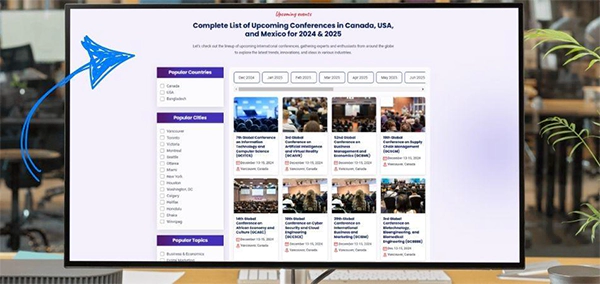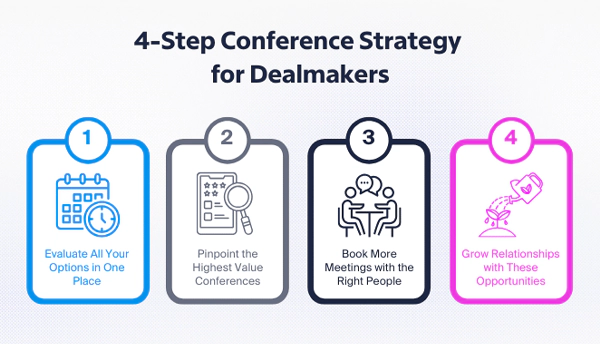I’ve been to a fair share of international conferences, and let me tell you from my experience, it can be a major game-changer for your career.
In fact, 70% of the attendees say that in-person events are the best source for training and professional content. (Source: Freeman 2024)
But with so many options available, how can you choose the right event that suits all of your requirements? Well, in this read I will be sharing my top tips for choosing the right international conference to attend. From identifying your goals to navigating the conference.
Let’s get straight into it!
How Do International Conferences Differ from Local Conferences?
International and local conferences differ significantly in scope, audience, and opportunities. Local events typically focus on regional topics, addressing a domestic audience and encouraging connections within a specific area. These events are ideal for sharing ideas and addressing local challenges, but may have limited global exposure.
In contrast to that, international ones bring together participants from various countries, offering a broader perspective on global issues.
They serve as a platform for cross-cultural collaboration, allowing attendees to exchange diverse ideas and insights. The discussions often have a worldwide impact, addressing challenges that transcend national boundaries.
Countries like Canada, the United States, Germany, and Japan frequently host cross-border conferences, attracting scholars and professionals worldwide.
For example, a conference in Canada provides attendees with the opportunity to engage with global experts, explore innovative research, and build international networks, enhancing their professional growth significantly.
How to Choose the Right International Conference to Attend?

Participating in international conferences can help you advance professionally and offer excellent educational opportunities. However, choosing the right conference can be challenging.
It is essential to consider various factors to ensure your time and resources are spent wisely. Here are key points to consider when selecting an internationally recognized convention to attend:
Define Your Goals and Interests
When choosing a conference, first think about your professional goals. Attend a conference that aligns with your current interests and career ambitions.
Consider if you want to network, learn about new research, or promote your work. Identifying your key goals will help you find an event that meets your needs.
Research the Reputation of the Conference
The reputation of the event also plays a significant role in its value. Research past events and check the credentials of the speakers and organizers.
You want to be part of an event with high standards and well-regarded individuals. A well-known conference can also provide more networking opportunities and exposure.
Analyze the Conference Topics and Sessions
Examine all the major topics and sessions of the convention. Review the agenda to ensure the subjects discussed are relevant to your field and interests.
A conference with a diverse range of sessions offers you the chance to learn and grow in different areas. Consider the variety and depth of the discussions before making your decision.
Consider the Location and Accessibility
The location of the conference should be practical for you to attend. Choose a convention that is near your city or country so that it can travel to the actual location.
Consider the cost of travel and accommodation, as well as the overall accessibility of the venue. A well-located event can make your experience more enjoyable and less stressful.
Analyze the Speaker and Attendee Quality
For the conference to be valuable, the quality of the speakers and other participants is essential. Find out who will be speaking and whether they are leaders in your field.
You should also consider the attendees, as networking with knowledgeable individuals can lead to valuable connections and collaborations.
Look at the Conference Size
A conference’s size can affect the experience. Larger conferences offer more sessions and networking opportunities, while smaller ones might provide more intimate discussions and easier access to speakers.
Think about what type of environment you prefer to help you decide which size will suit your needs best.
Check for Opportunities to Present Your Work
Many international conferences offer attendees the chance to present their research or projects. Presenting can help you gain recognition in your field and receive valuable feedback. Look for events that offer these types of opportunities if showcasing your work is one of your goals.
Review the Conference Cost
The cost of attending a conference is an important factor to consider. Factor in the registration fee, travel expenses, and accommodation costs.
Look for any discounts or funding opportunities that may be available. Ensuring that the cost fits within your budget will help you make a more informed decision.
Read Attendee Reviews and Feedback
Before registering for a conference, take time to read reviews and testimonials from previous attendees. These can provide insight into the quality of the event and what you can expect.
Positive reviews can help you confirm that the event is worth attending, while on the other hand, negative feedback can help you avoid wasting time and money.
Choosing the right international conference is crucial for your career growth. Carefully evaluate the factors mentioned to ensure the conference aligns with your goals and offers the opportunities you need for learning, networking, and professional development.
Do You Know?
According to the global conferences, attending an international conference can offer you some outstanding opportunities to learn, network, and expand one’s horizons.
Key Factors to Consider Before Attending an International Conference
Participating in an internationally recognized conference can lead to priceless opportunities. To make the most of the experience, planning every detail carefully is essential. Here are some additional factors to enhance your preparation:
- Plan Pre-Conference Networking: Connecting with attendees or speakers in advance builds rapport and helps you utilize networking opportunities effectively when the event begins.
- Prepare Effective Follow-Ups: After the conference, ensure you promptly follow up with contacts you made to establish long-term connections and collaborations.
- Review Cultural Etiquette: Research local customs and cultural norms of the host country to make your visit respectful and engaging.
- Ensure Adequate Rest: Managing energy levels during a conference is crucial, so prioritize rest to stay productive throughout the event.
- Stay Updated on Technology Needs: Ensure you bring the required devices, adapters, and backups to stay connected and make presentations smoothly.
- Diversify Knowledge Sources: Look for opportunities outside formal sessions, like informal discussions, exhibitions, and breakout sessions to learn from varied perspectives.
- Assess Value-Added Events: Some conferences include workshops, field visits, or career fairs—evaluate if these extras align with your goals.
Thorough preparation for an international conference makes the experience more rewarding. Focus on these tips to enrich your participation and maximize the event’s potential for your professional growth.
What Are the Networking Opportunities at the International Conference?

At international conferences, networking creates opportunities for collaboration, knowledge exchange, and deep connections.
Taking advantage of these opportunities strategically can help you build lasting relationships and expand your professional network. Explore the following ways to make the most of networking at these events:
Engage During Informal Networking Sessions
Taking part in informal sessions like coffee breaks or receptions allows for natural interactions and meaningful conversations.
These relaxed settings often encourage open discussions, making it easier to connect with others. Use these opportunities to introduce yourself and share your professional interests without the pressures of formalities.
Attend Workshops and Panels
The perfect setting for group interactions and targeted conversations is offered by workshops and panels. By actively participating in such activities, you can meet individuals who share your professional interests.
Listening attentively and contributing to these discussions can leave a lasting impression and open doors for future collaborations.
Utilize Dedicated Networking Areas
Many conferences offer designated spaces specifically designed to encourage attendee interactions. These areas serve as hubs for casual conversations and quick introductions.
Spending time in these spaces increases your chances of meeting like-minded professionals and establishing meaningful connections that can extend beyond the conference.
Participate in Roundtable Discussions
Smaller, topic-focused roundtable discussions are an excellent way to network in a structured yet approachable manner.
Engaging in these sessions helps you connect with individuals who share similar concerns or goals. These discussions also allow you to exchange ideas and insights on specific industry-related topics.
Use Event Apps and Tools
Conference organizers often provide apps or platforms to help attendees connect before, during, and after the event. Using these tools lets you explore attendee profiles, schedule meetings, or join discussion groups. By engaging with these resources, you can maximize your networking potential and establish pre-event connections.
Seek Out Collaborative Projects
Exploring opportunities for joint projects or research during the conference can strengthen your professional network significantly.
Discussing ideas with others and expressing your interest in partnerships can lead to collaborative ventures. These initiatives often form the foundation for lasting professional relationships and future achievements.
International conferences offer numerous avenues for meaningful networking. Focusing on these opportunities can enhance your experience, build stronger connections, and create possibilities for long-term collaboration. Take the time to nurture these relationships beyond the conference.
Tips to Maximize Your Investment in an International Conference

It takes careful preparation and calculated moves to get the most out of your international conference investment. Making the most of your time, money, and effort is what it entails. Below are some key strategies to help you maximize your experience at the event:
Set Clear Objectives Beforehand
Defining your objectives beforehand helps you focus on what matters most during the conference. Consider your professional needs and expectations to prioritize your activities.
Establishing specific goals will guide your decisions on which sessions to attend and whom to connect with, ensuring a fruitful experience.
Prioritize Important Sessions
You should choose sessions that are directly beneficial to your professional growth. Reviewing the schedule helps in identifying the most relevant sessions.
Attending these critical sessions ensures you use your time wisely and acquire information that aligns with your learning objectives.
Use Scheduled Breaks Wisely
Scheduled breaks offer opportunities to connect with speakers, ask questions, or network with attendees. During these moments, make an effort to talk to new people or deepen existing connections. Engaging during breaks adds additional value to your experience beyond the formal sessions.
Take Comprehensive Notes
By taking thorough notes, you can better remember information and later share it with your team. Write key points, interesting quotes, or ideas you would like to explore further.
This way, you create a valuable resource that helps you keep the knowledge gained and apply it effectively after the event.
Collect Valuable Resource Material
The advantages of the conference can be increased by gathering useful resources like handouts, slides, and digital materials. Gather anything that supports the main ideas discussed, especially insights that resonate with your professional needs. Having access to additional resources provides lasting value that can be referred back to in the future.
Engage in Post-Conference Reflections
Reflecting on your experiences once the conference is over helps you analyze what you have learned. Consider how you will apply the new knowledge to your work or projects. By assessing the value of different aspects, you can better implement these lessons and maximize the outcomes for personal and professional growth.
Maximizing your investment in an international summit takes planning, effective participation, and post-event actions. Utilizing the suggested strategies will enrich your experience and help you extract the maximum possible benefits, enhancing your professional development significantly.
Closing Remarks
A fulfilling experience that expands your horizons and advances your career is going to an international conference. These events bring together a diverse mix of people, giving you the chance to make connections and gain meaningful insights into your field.
When considering how to choose the right world conference to attend, you should align the conference’s offerings with your goals. Carefully consider factors like reputation, speaker quality, cost, and the opportunity to network. This approach ensures your time and resources are invested wisely.
Always be open to new opportunities and ready to interact with different people. Take notes, stay curious, and be active during every session. With this mindset, we wish you an exciting and fulfilling event experience ahead.








